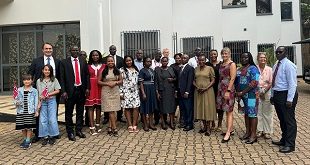
Kampala, Uganda | THE INDEPENDENT | The Constitutional Court has dismissed a petition by Norman Tumuhimbise and Unwanted Witness Uganda, a Civil Society Organization challenging the government shut down of mobile money and internet services during the 2016 general elections.
A panel of five Constitutional Court Judges led by the Deputy Chief Justice, Richard Buteera dismissed the petition on grounds that the shutdown was justifiable within the context of the available statutes and regulations. The other members of the panel are Kenneth Kakuru, Catherine Bamugemereire, Christopher Izama Madrama and Irene Mulyagonja, who wrote the lead judgment.
In their petition, the applicants argued that the shutting down of social media platforms during February 2016 presidential, parliamentary and local government elections and swearing-in of the President-Elect in May was inconsistent with the Constitutional provisions that guarantee the right to freedom of speech and expression.
They also argued that the shutdown of mobile money transfer services during the general elections violated Constitutional provisions, which protect the right to livelihood and life. Tumuhimbise told the court that the internet was shut down at the time he was expected to conduct an interview with to submit his contribution to a book published once a year.
He said that by the time internet was restored, the deadline for the interviews had already elapsed leading to the termination of his contract, which cost him USD 500 that each contributor was entitled to. The petitioners asked the court to declare that the shutdown of mobile money and internet services by the government through Uganda Communications Commission unconstitutional.
However, in his response, the Attorney General through the Principal State Attorney, Jimmy Oburu Odoi asked the court to dismiss the petition on grounds that it did not raise any questions that needed Constitutional interpretation. He also argued that the government suspended the social media because of national security and public interest to ensure peace and order.
“That the suspension was done in good faith and for purposes of securing the country against the reasonably suspected risk of incitement of violence by publishing unregulated content on social media, which is permissible under article 43 of the constitution”, the government argued.
In their decision, the Justices concurred with the government arguing that there was no constitutional question that required their interpretation, saying the application should have been filed in another court.
Justice Madrama argued that the matters relating to freedom of speech and expression were determined by the Supreme Court in a similar petition but the petitioners only caused a backlog at the Constitutional Court.
“Moreover the Constitutional Court has to defer handling other matters and invest the time and resources of a minimum of five Justices of Appeal to determine any Petition. This obviously adversely affects the efforts and capacity of the court to clear its caseload,” said Madrama.
On his part, Justice Kenneth Kakuru stated that the petition should have looked at a comparative study detailing the circumstances under, which the internet may be shut down in free and democratic societies but still there was no reasonable cause of action by the Petitioners.
“Before I take leave of this matter I would like to observe that a number of NGOs and individual citizens are bringing to this court well-intended but poorly conceived petitions. These petitions are shallow both in form and substance. It could be that they are encouraged by the past success of public interest cases in this court or by the fact that this court has adopted an unwritten rule of not condemning unsuccessful Petitioners to costs,” said Kakuru.
Adding that, “Whatever the case, there is serious need to ensure that only deserving petitions are heard and the court in my view should proceed to strike out unfounded petitions summarily and only proceed to hear and determine deserving ones”.
During the just-concluded elections, the government shut down both internet and mobile money services. A number of people have filed several petitioners arising from the latest shutdown. Some of the key petitioners include the East African Law Society and Male Mabirizi among others.
*******
URN
 The Independent Uganda: You get the Truth we Pay the Price
The Independent Uganda: You get the Truth we Pay the Price


